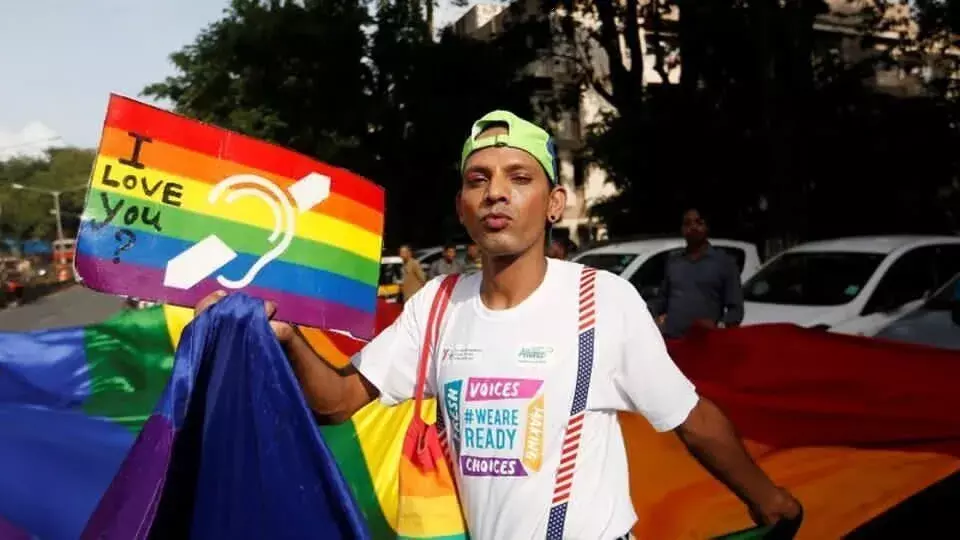“Notion Of Man-Woman Not An Absolute Based On Genitals”
CJI response to Solicitor General on same sex marriage was firm;

“There is no absolute concept of a man or an absolute concept of a woman at all. It's not the question of what your genitals are. It's far more complex, that's the point. So even when Special Marriage Act says man and woman, the very notion of a man and a woman is not an absolute based on genitals,” said Chief Justice of India DY Chandrachud. The CJI was responding to a statement given by Solicitor General Tushar Mehta during the hearing of same sex marriage on Tuesday.
The Supreme Court commenced its hearing on a bunch of petitions demanding legal recognition for same-sex marriages in India, clarifying that the remit of the proceedings will be confined to validation of such marriages under the Special Marriage Act (SMA).
A five-judge bench headed by CJI Chandrachud said that it will not be touching upon the aspects of personal laws, adding an “incremental approach” to the process of judicial determination in the case will reflect “sage wisdom”. The bench also comprises Justices SK Kaul, Ravindra Bhat, Hima Kohli, and PS Narasimha.
The bench said that there is an element of legislative action involved in the matter and thus, it would be prudent to confine the scope of the matter to recognition of same-sex marriages under the SMA.
“Confine yourself to this canvas and allow society to evolve, Parliament to evolve... in these times of evolving consensus, we have to move towards a more equal future but at the same time, we have to be conscious of our own limitations,” the Bench told the petitioners, led by senior counsel Mukul Rohatgi.
While the petitioners accepted the court’s suggestion, the union government, represented by Solicitor General Tushar Mehta, opposed the hearing on the ground that it is exclusively for Parliament to take a call on recognition of same-sex marriages.
According to the SG, the petitioners were wrong in seeking conferment of a legal right of recognition of same-sex marriage from a court, which lacked the jurisdiction to grant such a relief.
Mehta also said the subject with which the apex court is dealing is virtually the creation of a socio-legal relationship of marriage, which would be the domain of the competent legislature.
“When the subject is in the Concurrent List, we cannot rule out the possibility of one state agreeing to it, another state legislating in favour of it, another state legislating against it. Therefore, in absence of the states being not joined, the petitions would not be maintainable, that is one of my preliminary objections,” he said.
Rohatgi began the submissions on behalf of the petitioners, emphasising on equal rights for the LGBTQI+ community to get recognition under the social institution of marriage.
“My rights are equal to those of others. They have a right to marriage, the right of respectability. A concomitant of rights flow from that respectability. The same should be granted to me. We cannot be discriminated against because we may be ten thousand and the others are ten crores,” he said.
While citing various judgements, Rohtagi further said, “Both gender and biological attributes contribute distinct components of sex...'The expression sex is not limited to biological sex of male or female but intended to include people who consider themselves neither'- this found its way into Anuj Garg. Recognition of one's gender identity lies at the heart of the fundamental right to dignity.”
Senior Advocate Kapil Sibal who was appearing for Jamiat-Ulema-i-Hind, putting his personal opinion before the court argued on a similar line as the SG. While stating at the outset that he supported equal rights for the queer community, he said, “We believe in the autonomy of individuals. I think people are entitled to have a relationship of whatever kind…”
He then asked the Bench that if the marriage is made valid, what would happen if there is a child involved and the marriage breaks down.
“Under Criminal Procedural law, who is the woman? Who will get maintenance? These are serious societal consequences of that declaration,” he added.
Meanwhile, advocate Menaka Guruswamy, also arguing for the petitioners, said it's a question of an individual's rights. “Marriage is a question of rights. I am not able to notify my partner for life insurance. I cannot buy insurance from the Supreme Court Bar Association for my family,” she said.
The hearing has left many intrigued with many coming in support of the CJI’s statement as well. “It takes guts to come out and say something like this publicly. I had some hopes ignited after hearing this. I was on the edge most of the time,” Anjali Mukherjee, a Delhi based software engineer, who says they are gender fluid said.
If same sex marriage legalised then India, it will be first United Nations member from Asia to do so. The hearing of the case will continue on Wednesday.

